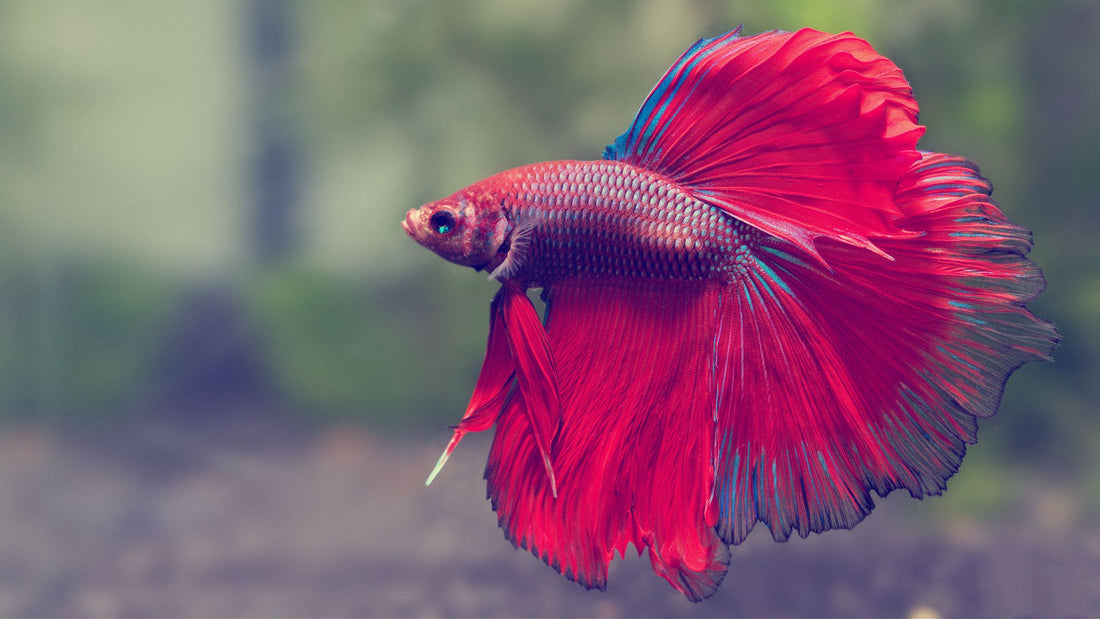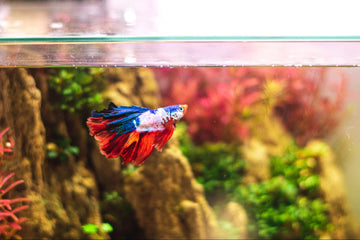How Long Do Betta Fish Live? Understanding the Lifespan of Betta Fish

Contents
Betta fish, known for their vibrant colors and elegant fin displays, have captured the hearts of many aquarium enthusiasts. However, their longevity and well-being are topics of concern for many Betta owners.
In this article, we will delve into the intriguing world of Betta fish, exploring their lifespans and the essential care they require throughout their various stages of life. Whether you already have a Betta fish or are thinking of getting one, knowing how to keep them healthy and happy is vital for their well-being.
How Long Do Betta Fish Live?
Betta fish are one of the most popular aquarium pets, thanks to their vibrant colors and graceful fins. But if you are considering getting a betta fish, you might wonder how long they will live with you. The truth is, there is no simple answer to this question. The lifespan of a betta fish depends on many factors, such as their genes, their environment, and their care.

The lifespan of betta fish varies depending on their living conditions
In their natural habitat, betta fish usually live for about 2 to 3 years. They are native to Southeast Asia, where they inhabit shallow, warm, and slow-moving waters. They are also known as Siamese fighting fish, because the males are very territorial and aggressive towards each other.
However, betta fish can live much longer in captivity - up to 8 years or even more! This is because they can access better food, water quality, and health care than in the wild. They also don’t have to face predators, parasites, or diseases that can shorten their lives. However, you can consider a 6- to 8-year-old Betta fish to be quite elderly since the average Betta would not be expected to exceed five years.
But not all betta fish will live that long. Some may have shorter lifespans due to diseases, injuries, or stress. To increase the chances of your betta fish living a long and happy life, you should provide them with a suitable tank, a balanced diet, and regular water changes, which we will discuss further in this article.
What Factors Influence the Lifespan of a Betta Fish?

The lifespan of Betta fish varies depending on the breed.
Betta fish are colorful and smart pets that can live for several years if given proper care and attention. However, their lifespan can vary depending on many factors that affect their health and happiness. To ensure that your betta fish lives a long and fulfilling life, you need to understand and manage these factors carefully.
Here are some of the most important factors that influence how long betta fish live:
- Genetics: Just like humans, betta fish have different genetic makeups that determine their physical and behavioral characteristics. Some betta fish may have inherited genes that make them more resilient to common diseases, parasites, or stress. These genes can give them an advantage over other betta fish and help them live longer.
- Environment: The environment that you provide for your betta fish is one of the most crucial factors that affect their lifespan. Betta fish are native to the tropical regions of Southeast Asia, where they live in shallow and warm waters with plenty of plants and hiding places. Therefore, you need to mimic their natural habitat in your tank as much as possible.
- Water Quality: Betta fish are very sensitive to the quality of the water in their tank. Poor water quality can lead to various health problems.
- Tank Size: Betta fish need enough space to swim and explore in their tank. A small and cramped tank can cause stress and boredom, which can lower their immune system and shorten their lifespan.
- Temperature: Betta fish are tropical fish that prefer warm water temperatures. If the water temperature is too low or too high, it can cause stress and weaken their immune system.
- Lighting: Betta fish need a natural day and night cycle to regulate their biological clock and behavior.
- Diet: A balanced and nutritious diet tailored to the needs of betta fish is essential for their vitality. Betta fish are carnivores, which means they need high-quality protein and fiber in their food.
- Care and Attention: Regular tank maintenance and prompt treatment of any illnesses or stressors play a significant role in extending the lifespan of betta fish. You should also interact with your betta fish gently and provide them with some stimulation and exercise.
- Environmental Stability: Betta fish are creatures of habit that prefer a stable and consistent environment. They do not like sudden changes or fluctuations in their water temperature, quality, parameters, or their tank surroundings. These changes can cause stress and shock, which can weaken their immune system and shorten their lifespan.
Betta fish are wonderful pets that can brighten up your life with their beauty and personality. By understanding and managing the factors that influence their lifespan, you can ensure that your betta fish lives a long and happy life. They are amazing creatures that deserve your love and attention.
The 5 Life Stages of a Betta Fish
Betta fish are amazing creatures with bright colors and lively personalities. Their life cycle is a fascinating journey that starts from an egg and ends as an adult. Along the way, they go through five important stages that affect their health and how long they live.
In this section, we'll explore these stages, highlighting how they impact the lifespan of these popular aquatic pets and what caretakers can do to support their growth and well-being through each phase.
Stage 1: Egg

In the beginning, Betta fish exist as delicate eggs, often clustered and zealously protected by the male Betta. Their eggs are usually white or translucent in color and have a small dot in the center, which is the embryo. During this vulnerable phase, the eggs' survival hinges on the environmental conditions and the male's diligence in safeguarding them.
Eggs that are well-cared for have a higher chance of developing into healthy fry. Any adverse conditions during this stage can lead to developmental issues or failure to hatch, affecting the longevity and health of the Betta fish.
Some of the factors that affect the egg stage of the betta fish are:
- The temperature of the water should be 80-86°F (27-30°C), with the best range being 82-84°F (28-29°C). The eggs may not hatch or grow well if the water is too cold or too hot.
- The water quality is very important for the eggs to survive and develop. The water should be clean, clear, and have no ammonia, nitrite, or nitrate. The pH should be around 7.0 and the hardness should be soft to moderate. You can keep the water quality good by changing the water and filtering it often.
- The quality of the eggs depends on how healthy and old the female betta is, and how well the pair mates. Younger and healthier females usually make more and better eggs than older or sick ones. Breeders who have more experience also usually have more success than beginners.
Stage 2: Fry

Once the eggs hatch, the Betta fish enter the 'fry' stage. These tiny beings, measuring just fractions of an inch, initially rely on their yolk sacs for nutrition. In this critical growth phase, the fry rapidly develop their bodily functions and start to exhibit early signs of their species' famed coloration.
Betta fry need optimal water quality, appropriate food, and a safe environment free from stressors. This stage is pivotal for their immune system development and overall growth. Proper care during the fry stage lays the foundation for a healthy adult Betta, influencing their resistance to diseases and overall lifespan.
Here are some additional tips to help you during this stage:
- Use a sponge filter or an air stone to provide oxygen for the fry, as their labyrinth organ is not fully developed yet. Make sure the filter is gentle enough to avoid sucking up the fry.
- Keep the water temperature steady at 85° to 88°F (29° to 31°C). This warm water helps your fish grow and stay healthy. Use a good aquarium heater and a thermometer to make sure the temperature doesn’t change.
- Perform frequent water changes to keep the water clean and prevent ammonia buildup. Change about 10-20% of the water every day or every other day, using a siphon or a turkey baster to avoid disturbing the fry.
- Feed the fry small amounts of live food several times a day. Start with infusoria for the first week, then switch to baby brine shrimp, microworms, or vinegar eels. As the fry grows, you can introduce frozen or freeze-dried foods, and eventually pellets or flakes.
- Keep the tank in a dimly lit area to reduce stress and prevent algae growth. Provide a natural day and night cycle of about 10-12 hours of light per day. Avoid placing the tank near a window or a bright source of light.
- Separate the fry by size and gender when they are about 8 weeks old. This will prevent cannibalism, aggression, and unwanted breeding. You will need several tanks or containers to house the fry individually or in small groups.
Stage 3: Juvenile

As juveniles, Bettas start to develop their iconic coloration and fin structure.
As juveniles, Bettas undergo significant physical changes. This stage sees them grow in size, and their colors and fins start to become more pronounced. Juvenile Bettas are curious and active, exploring their environment with increased agility.
During this period, the Betta's personality starts to emerge, and they begin to display the territorial behaviors characteristic of the species. Proper care during the juvenile stage is crucial for developing a robust adult Betta with a vibrant appearance and a long lifespan.
Here are some more tips to care for your betta fish during the juvenile stage:
- Use a larger tank or separate the juveniles by size and gender to prevent overcrowding, aggression, and unwanted breeding. Juvenile bettas can grow up to 2 inches (5 cm) in length and need at least 5 gallons (20 liters) of water per fish.
- Use a gentle filter and an air pump to provide oxygen and water circulation for the juveniles, as their labyrinth organ is still developing. Avoid strong currents or bubbles that can stress or injure the fish.
- Feed the juveniles high-quality food twice a day, but only as much as they can eat in 2 minutes. You can use flakes, pellets, or freeze-dried food, but make sure they are specially formulated for bettas. You can also supplement their diet with live or frozen food, such as bloodworms, brine shrimp, or daphnia.
- Keep the tank in a well-lit area to stimulate the juveniles’ activity and coloration. Provide a natural day and night cycle of about 12-14 hours of light per day. You can use artificial or natural light, but avoid direct sunlight or sudden changes in brightness.
- Provide plenty of hiding places and enrichment for the juveniles, such as plants, rocks, caves, or toys. This will help them feel secure, reduce stress, and encourage their curiosity and exploration.
Stage 4: Young Adult

Young adult stage is marked by their full display of striking colors and fin extensions.
Reaching young adulthood, Bettas attain sexual maturity, typically around 4 months of age. This is the period when they reach sexual maturity and exhibit the full spectrum of their striking colors and distinctive fin patterns. During this phase, Bettas are at their most vibrant and active, showcasing a captivating display of their species' characteristic beauty and behavior.
They require a balanced diet, consistent water quality, and an environment that allows for both stimulation and relaxation. It's during this phase that the Betta's long-term health can be most influenced by their care. Proper diet, avoidance of stress, and prevention of common diseases are crucial to ensuring that the Betta reaches its full lifespan potential.
Follow these suggestions to ensure their healthy and proper development:
- Feed your betta fish a varied diet of high-quality pellets, flakes, and frozen or live foods, such as bloodworms, brine shrimp, or daphnia. Avoid overfeeding, and remove any uneaten food after 5 minutes.
- Perform regular water changes, at least once a week, to keep the water clean and free of ammonia, nitrite, and nitrate. Use a gravel vacuum to siphon out the waste and debris from the substrate. Replace 25% to 50% of the water with dechlorinated water that matches the tank temperature.
- Provide your betta fish with a stimulating and comfortable environment. Add plants, rocks, caves, or other decorations to create hiding places and reduce stress. Avoid sharp or rough objects that could damage the betta’s fins.
- Check your betta fish regularly for any signs of illness or injury, such as loss of appetite, lethargy, dull coloring, tattered fins, white growths, abnormal swimming, labored breathing, clamped fins, or bloating. If you notice any of these symptoms, consult a veterinarian or an experienced betta keeper for advice and treatment.
Stage 5: Mature Adult

With proper nutrition and care, adult Bettas can enjoy a long and healthy life.
Once Bettas enters the mature adult stage, usually around 6-7 months of age, they reach the peak of their physical development. This stage is marked by a continuation of their vibrant coloration and active behavior, although the rate of their physical growth begins to taper off. It's a period of stability, but also one that requires sustained, careful attention to maintain their well-being.
They need to have their diet, water quality, and environment monitored and adjusted regularly to prevent them from getting stressed or bored. It is also essential to check their health regularly and treat any signs of aging or disease as soon as possible.
By providing them with the right balance of care, nutrition, and environmental stability, mature adults can thrive and enjoy their natural lifespan in good health and happiness.
To best care for your mature adult betta fish, follow these tips:
- To keep the water clean, use a mild filter that does not create strong currents. You can also make the tank cozy for your betta fish by adding live or silk plants and hiding places. Gravel that absorbs waste can help keep the tank cleaner as well.
- Adult betta fish need food that is specially made for them, such as pellets, flakes, or frozen foods. These foods are high in protein and low in fillers. You can also give your betta fish some treats like bloodworms or brine shrimp occasionally.
- Feed your betta fish once or twice a day, and only give them the amount they can finish in a few minutes. Remove any leftover food to prevent the water from getting dirty.
- Change about 25% of the water every week or two, depending on how big the tank is and how good the filter is. You can use a test kit to check the water regularly, and make sure it has these levels :
- pH: 6.5–7.5
- Ammonia: 0 ppm
- Nitrite: 0 ppm
- Nitrate: less than 20 ppm
- Watch your betta fish for any signs of sick or stressed, such as not eating, being lazy, losing color, having torn fins, growing white stuff, or swimming weirdly. If you notice any of these signs, you should act quickly and treat your betta fish appropriately.
- Do not keep your betta fish with other fish that do not get along with them, such as other bettas, fish that nip fins, or fish that are mean.
- Make your betta fish happy by giving them things to play with, such as toys, mirrors, or different plants.
- Have fun with your betta fish and their amazing personality!
Providing the Best Environment and Care for Your Betta Fish
Setting up the perfect home for your Betta fish is not just about aesthetics; it's about creating a healthy and stimulating environment that mimics their natural habitat. Let's dive into how to set up and maintain the ideal tank for your Betta fish.
Tank Setup and Maintenance
A spacious tank is the first step in providing a comfortable home for your Betta. A tank of at least 5 gallons (20 liters) is recommended. This size ensures enough space for swimming and exploration, which is crucial for your Betta's physical and mental well-being. After selecting the tank, the next step is to set up a filtration system. Bettas live best in clean water with a gentle flow, so choose a filter that won't create strong currents.

Bettas are diurnal, so it's important to set up lighting in their tank to match their active hours.
Regular maintenance of the tank is essential. This includes weekly water changes, where you replace 20-25% of the water to keep the environment fresh and free of harmful chemicals. Testing the water regularly for pH levels, ammonia, nitrite, and nitrate will help you maintain the right balance and detect any issues early.
Another important aspect of tank setup and maintenance is lighting. Bettas are diurnal fish, which means they are active during the day and sleep at night. Therefore, they need a regular day-night cycle to regulate their biological rhythms. You can use a timer to turn the lights in your tank on and off, or you can follow the natural light cycle of your location. Ideally, you should provide your Betta with 12 hours of light and 12 hours of darkness per day. Too much or too little light can stress your Betta and affect its health and behavior.
Importance of Water Temperature and Filtration
Bettas are tropical fish and thrive in warm water. Maintaining a consistent temperature between 78° to 80°F (or 25° to 27°C) is ideal. Investing in a reliable heater and a thermometer will help you keep the temperature stable. A stable temperature not only keeps your Betta comfortable but also prevents stress and susceptibility to diseases.

A good filtration system is equally important
A good filtration system will help in keeping the water clean and oxygenated, removing waste products and preventing the buildup of harmful substances. However, make sure that the water flow from the filter is not too strong, as Bettas prefer calmer waters. A gentle flow will make your Betta feel more relaxed and natural.
Decorations and Plants for Betta Fish Tanks
Betta fish are not only a beautiful and lively addition to your home but are also intelligent and curious creatures. They thrive when their environment is enriched with items to explore and interact with.

Bettas enjoy having things to play with and explore in their tank
To make your Betta feel more comfortable and happy, you should add decorations and plants that mimic their natural habitat:
- Use caves, rocks, and driftwood to enhance the tank's look and provide exploration areas. However, avoid anything with sharp edges that could injure your fish.
- Choose silk or live plants such as moss balls or java ferns over plastic ones. These are safer for Betta's fins and offer hiding spots that reduce stress.
- An option is to include toys like ping pong balls, floating rings, and mirrors for them to play and explore.
You can also interact with your betta fish by feeding them by hand, training them to do tricks, or watching them swim and flare. You will discover that your betta fish has a fantastic personality and a unique charm.
Recognizing and Addressing Betta Fish Health Issues
Betta fish are usually vibrant and active, but they are susceptible to various illnesses. To keep your Betta fish healthy and happy, you need to recognize the symptoms of common diseases and consult a veterinarian if needed.

Discoloration is one of the most common symptom that your Betta is sick.
Here are some of the main indicators that your Betta fish may be unwell:
- Look for color loss, patches, or spots indicating stress or disease.
- Notice if your Betta is refusing food or eating irregularly, which can signal health issues.
- Be aware of any decrease in activity or aggression, as these can be signs of illness.
- Unusual swimming patterns, lethargy, or hiding indicate potential health problems.
- Symptoms like bulging eyes, mucus on the body, rubbing against surfaces, isolation, sores, bloating, or changes in shape or size can point to sickness.
If your Betta fish shows any concerning health symptoms, consult your veterinarian, as these could be indicative of these illnesses:
- Physical Injury
- Parasites
- Bacterial Infections
- Fungal Infections
- Fish Pox: Wart-like growths caused by a herpes virus.
- Ammonia or Chlorine Poisoning: From poor water quality, affecting gills and organs.
However, not all veterinarians treat fish, so it's important to find a specialist familiar with bettas in your area. Regular contact with a vet experienced in betta care can ensure timely intervention and proper treatment, extending your fish's life.
Conclusion
Betta fish are beautiful creatures that can brighten up your home with their vivid colors and distinct personalities. They can live a long and happy life in captivity, depending on their genes, surroundings, and treatment. With careful care, they can reach 6-8 years of age or even more. Each stage of a Betta fish’s life, from fragile eggs to colorful adults, needs special care and attention.
At Tropicflow, we not only provide valuable information on Betta fish care but also offer a wide range of beautiful and exotic Betta fish.
If you're looking to enhance your aquarium with these captivating creatures, don't hesitate to contact Tropicflow and explore our catalog of stunning Betta fish.
Your journey into the world of Betta fish can be both rewarding and enchanting, and we're here to help you every step of the way!
No comments











0 comments